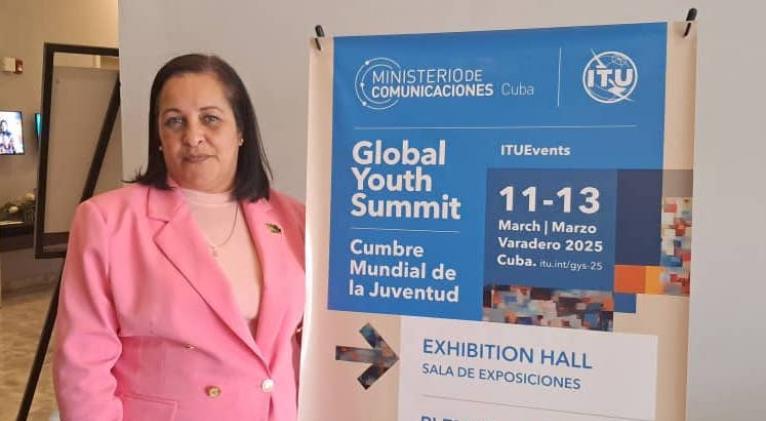Humanism, Ethics, and Resilience: Key Words for Youth and Technology in Cuba (I)
especiales

Humanism, ethics, and resilience are words that arise repeatedly in the dialogue with Cuba’s Minister of Communications, Mayra Arevich Marín, who spoke to the press during the International Telecommunication Union (ITU) World Youth Summit. The summit is being held at the Hotel Internacional in Varadero, where a wave of young people from all regions of the world are sharing their experiences, projects, and expectations surrounding new technologies.
How did Cuba welcome the ITU’s decision to hold this Summit here?
“For us, it is a gesture of trust. We have been members of ITU for many years, and for them to choose us, a sovereign and socialist nation, to host a Youth Summit, acknowledges the work our country’s leadership has been doing, always with a focus on young people.
“I believe this is a very important opportunity for us to showcase what we do, what our young people achieve every day, and the talent fostered by the Revolution. Last year, we approved the Comprehensive Policy for the Care of Children, Adolescents, and Youth at the National Assembly, and one of the pillars of that policy is related to digital transformation. How can we contribute to this policy through digital transformation to help young people realize their potential?
“We are truly very pleased to have been chosen, so that our youth can demonstrate all the talent we have to offer, exchange ideas with young people from other countries, listen to their competencies, strengths, and weaknesses, and share our knowledge from our cultural perspective. Representing the region is also an important responsibility that the ITU has entrusted to us, confident that we will represent it authentically through the thinking and actions of our country.”
The development and use of artificial intelligence is one of the core topics of the Summit. What are the main challenges for Cuba, and specifically for its youth?
“Within the policy for digital transformation, there is a strategy for the development and use of artificial intelligence. For us, it is an opportunity because artificial intelligence is a technology that can greatly contribute to the development of the country’s fundamental processes. Of course, it entails risks and challenges, as we aim to develop an AI that aligns with ethical principles. It is very important to defend our principles of inclusion and the protection of human beings, which is why we want to develop this strategy.”
Can you share what has already been done in implementing this strategy?
“There are 12 projects in Cuba that have been identified as high-impact initiatives for the country’s economy, and they are prioritized for the use of artificial intelligence. Projects are being developed with universities, academia, and industry. Additionally, other projects have been implemented in various provinces, integrating important objectives, such as healthcare. We are working on a significant telemedicine project, as well as others that contribute to agricultural development using not only AI but also the Internet of Things and database technologies. We are committed and recognize that developing artificial intelligence and productive technologies is an opportunity for our country, but we must do so while defending ethics and humanity. We cannot create any technology that replaces the most important element: people.”
How much further could Cuban society, and specifically its youth, advance in telecommunications without the limitations of the U.S. blockade?
“The telecommunications sector is heavily affected by the blockade, which has a significant impact. For example, new information and communication technologies are not bought on a street corner or supplied by small businesses; they must be purchased on the international market, and we face complex limitations due to U.S. components. Technologies with more than 10% U.S. components cannot be acquired by us. There are markets and solutions that are inaccessible to us.
“Important platforms for the training of our ICT personnel are also blocked, which greatly affects the ability to provide more spontaneous training, as other young people here have access to. Cuban youth are highly resilient, and despite these limitations, they can speak about the achievements and results that can be showcased today. Cubans have always overcome the blockade by finding resilient solutions to something so inhumane and damaging.
“Without the blockade, our development would be far greater: our specialists would have easier access to certification, as certifying in certain technological processes is currently complex, requiring international collaboration.
“Nevertheless, we have made progress in digitalization. We have two digital payment platforms, Transfermóvil and EnZona, as well as Picta, Apklis, and Todus. These are platforms typically used by countries with greater technological development and resources than ours. However, thanks to the talent of the Revolution’s youth, today we can say we have these platforms that contribute so much to the transformation processes.
In many cases, these are led by young people. For example, the majority of the Transfermóvil team is very young…
“Transfermóvil has already been around for 10 years, and the young people working on the most advanced developments using these new technologies are those who joined the project from university. The same goes for the Z17 projects, Picta, and Apklis —these are young people who graduated from the University of Computer Sciences (UCI). We also have scientific and technological parks located on university campuses, such as the UCI and here in Matanzas. These dynamic structures have brought universities closer to achieving progress through digital transformation.”
Translated by Sergio A. Paneque Díaz / CubaSí Translation Staff














Add new comment